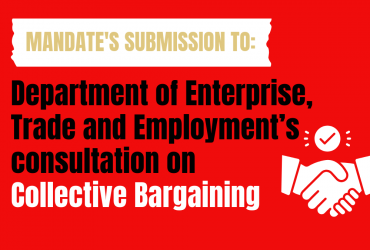US UNION LEADER URGES NEW TACTICS IN TAKING ON ANTI-UNION EMPLOYERS
Monday 21 April 2008
Delegates at the Mandate trade union conference were today (Monday, 21 April 2008) urged to adopt new tactics in their campaigns against anti-union employers. Pat O’Neill, Vice President of the American United Food and Commercial Workers union (UFCW), said unions now need to involve consumers, communities, civil rights, religious, and other labour organizations in their campaigns.
Mr O’Neill, who is a leader of North America’s largest private sector union, with over 1.3 million members, was speaking at Mandate’s biennial conference which is taking in the Hilton Hotel, Limerick, and is being attended by over 300 delegates.
Pat O’Neill explained that the UFCW is currently campaigning for more awareness of the actions being taken by anti union employer Wal-Mart.
“Like Ireland, we in the US have a lot of anti union retailers. Wal-Mart is the world’s largest food retailer and its yearly revenue exceeds 350 billion dollars which is more than the gross domestic product (GDP) of most nations.
“When we realised the futility of trying to organize Wal-Mart one store at a time, the UFCW launched the largest corporate social responsibility campaign in U.S. history. We engaged communities, workers, civil rights, religious, and other labour organizations in what we call the Wake up Wal-Mart campaign.
“Wake up Wal-Mart relentlessly exposes the company’s irresponsible business practices whether they are violations against worker, environmental, or consumer protections. So far we have recruited more than 700,000 Wake Up Wal-Mart activists who can, if called upon, put together a demonstration or action at every Wal-Mart store in the U.S.“
Paul Nowak, Head of Organising at the Trades Union Congress (TUC) in the United Kingdom, spoke of the recruitment drives that have taken place in the UK over the past ten years.
“By the mid 1990s, unions had spent over fifteen years in decline losing some six million members. In 1996, there was a move towards organising new members and since 1997, union membership in the UK has stabilised.”
He went on to say that there have been over 3,000 new recognition agreements since 1995 which cover 1.3 million potential members. “The key has been increased union focus on, and investment in, organising and recruitment.”
Mr Nowak pointed out that there are still huge inequities in the labour market in the UK and these inequities are increasing, for example:
· In 2000 for every £1 that a British worker earned, their Chief Executive earned £39 while;
· In 2006 for every £1 that a British worker earned, their Chief Executive earned £98.
“In six years the ratio difference of earnings between ordinary workers and their Chief Executive had more than doubled. The only way to combat such inequities is to strengthen the union movement through organising and recruiting new members and activists.”





